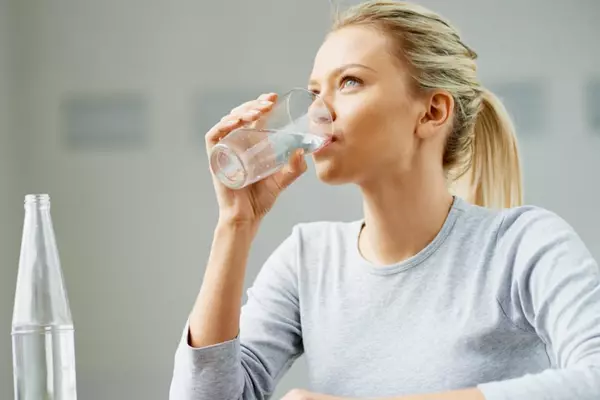How much water should I drink a day is a question that has many different answers.
There are many factors to consider, and the recommended water intake will vary from person to person. The best advice is to drink when thirsty.
In general, it’s advised that people drink half their body weight in ounces of water each day and make sure they’re staying hydrated with some food during the day if they’re active or during their waking hours if they’re not quite as active.
How Much Water Should I Drink A Day?
The recommended daily intake for adults is about 3 liters (1 quart, or a little over 1 liter) of fluid per day. This amount can vary, depending on the individual’s health and activity level.
Recommendations From Health Organizations
- The National Academy of Sciences states that an adult’s adequate intake (AI) is 28 to 36 ounces of fluid daily; this range is based on gender and age but also considers other factors related to health, such as activity level and weight.
- The Institute of Medicine (IOM) recommends an additional 64 ounces of water–10 cups–per day for sedentary adults; this recommendation is based on the health benefits of drinking more water and the risk of dehydration in the elderly.
- The American Academy of Pediatrics recommends that children drink one and one-half to two cups (about 200 to 300 milliliters) more than the AI in a single four-hour period. This amount can vary depending on how much physical activity the child is involved in, age, and weight.
Doctor Mike Answers: How Much Water Should You Drink a Day? | SELF
Importance Of Hydration
The human body is largely composed of water; it is necessary for every organ system and function. Prolonged periods of dehydration can lead to heart attacks, kidney failure, brain damage, and death.
The importance of drinking enough water cannot be overstated! (Some sources say that 75% or more, often more than one-half, even all human bodies are made up)
Factors That Affect Water Needs
1. Age, Sex, And Activity Level
Most healthy adults need about 12 cups or 3 liters of fluid a day (including water) unless they are exercising quite strenuously. An active person needs more than a less active person.
2. Season
The body needs more water in hot weather and when one is physically active; this is important to remember when traveling!
The U.S. recommended daily intake will keep an individual hydrated during normal activity in the summer if that amount of fluid is consumed each day.
During the winter months, it will not necessarily hydrate an individual properly if he/she is not consuming enough water daily.
3. Health Conditions
An individual should talk with a physician if they have any health condition(s) that may affect their need for water, such as kidney disease or diabetes, and if they are taking prescription medication(s) that may interfere with their hydration needs.
4. Food
Some foods are high in water content and include fruits, vegetables, and soups.
5. Medications
There are some medications that may cause excessive fluid loss through the kidneys or gastrointestinal tract.
6. Alcohol
An individual should consume more water than usual when consuming alcohol since alcohol is a diuretic. A diuretic causes the kidneys to lose more sodium (salt) and excrete more fluid (urine).

Signs Of Dehydration
Signs and symptoms of dehydration include:
Physical Symptoms
- Fatigue: This is one of the first signs of dehydration, so it is important to notice if an individual is having a slow reaction time and lethargy during the day.
- Dry Mouth: This symptom occurs because there may not be enough saliva to coat the tongue; this makes it difficult to taste food and drink fluid, leading to a dry mouth. The person’s tongue will appear shiny and feel sticky. There may be a metallic taste in their mouth, which can be due to low levels of zinc in their body or medications that cause a metallic taste in their mouth (antacids).
- Muscle Cramps Or Muscle Spasms: When the muscles in the legs become weak and cramp, it is a sign of dehydration.
- Headache: This is usually caused by fluid retention; a person may have nausea, dizziness, and even fainting if this occurs when there is also low blood pressure due to dehydration.
- No Sweating: The mechanism that causes an individual to sweat decreases as they age; therefore, they may not sweat as much as younger individuals due to reduced skin elasticity, less temperature regulation in the skin, and reduced performance of the sweat glands.
Cognitive Symptoms
- Confusion: Confusion is one of the first symptoms of dehydration because the brain has less fluid to function properly.
- Confabulation: Confabulation is a memory problem where somebody confuses reality and/or events with fiction. The person may have an elaborate story that they believe happened to them and can’t seem to correct themself when they realize that it didn’t happen in real life. Therefore, they contradict themselves; this is also a sign of dehydration.
- Drowsiness Or Sleepiness: Dehydration causes drowsiness—an individual will not feel as alert as usual and may appear sleepy for no apparent reason. This is especially important for the elderly because it can increase their risk of falling or hitting their head accidentally.
- Memory Problems: Dehydration can cause memory problems, such as confusion and difficulty with orientation to time and place.
- Changes In Personality: Some personality changes can occur, such as irritability and depression.
- Delirium: This is a more serious condition that arises when there is severe dehydration that affects a person’s state of consciousness, leading to poor attention span, poor memory, severe confusion (inability to concentrate), hallucinations (seeing or hearing things that aren’t actually there), paranoia (fear of imaginary threat), and even psychoses (abnormal thinking).
Tips For Staying Hydrated
- The best drink to stay hydrated is water.
- Avoid caffeinated and non-caffeinated beverages, such as soda pop; these drinks are not good for your body’s hydration levels and result in dehydration.
- Water is the best thing to drink; if the individual has a difficult time with the taste of water, try adding flavorings or slices of lemon or lime (which is good for their health as well).
- Use a straw: It is hard for an individual to drink enough water if they don’t like the taste of it, so try drinking through a straw. In general, the longer and larger the straw, the more quickly someone can drink their required amount of water daily.
- Add ice cubes to drinks or use ice in recipes: Use ice cubes instead of adding sugar or salt to drinks; you can also increase your intake of water just by adding more nutritional ingredients to your diet while decreasing high-sodium foods such as canned soups (which are typically high in sodium) and canned vegetables (which are also often high in sodium).
Conclusion
A large number of people don’t drink the required amount of water daily, which can result in dehydration. This is dangerous for every age group; however, the elderly are at a higher risk because their bodies are less able to recover from dehydration or produce enough fluids to maintain hydration levels.
The best thing you can do if you have any health conditions that require more fluid intake is to follow your doctor’s instructions regarding the amount of fluid you should drink daily.
Contact your doctor immediately if you have any questions about specific health conditions and water intake.
- James Hemings Macaroni And Cheese Recipe – History On A Plate - April 3, 2025
- French Dip Squares Recipe – Better Than A Sandwich! - March 25, 2025
- Erewhon Buffalo Cauliflower Recipe – A Healthy Twist - March 22, 2025


